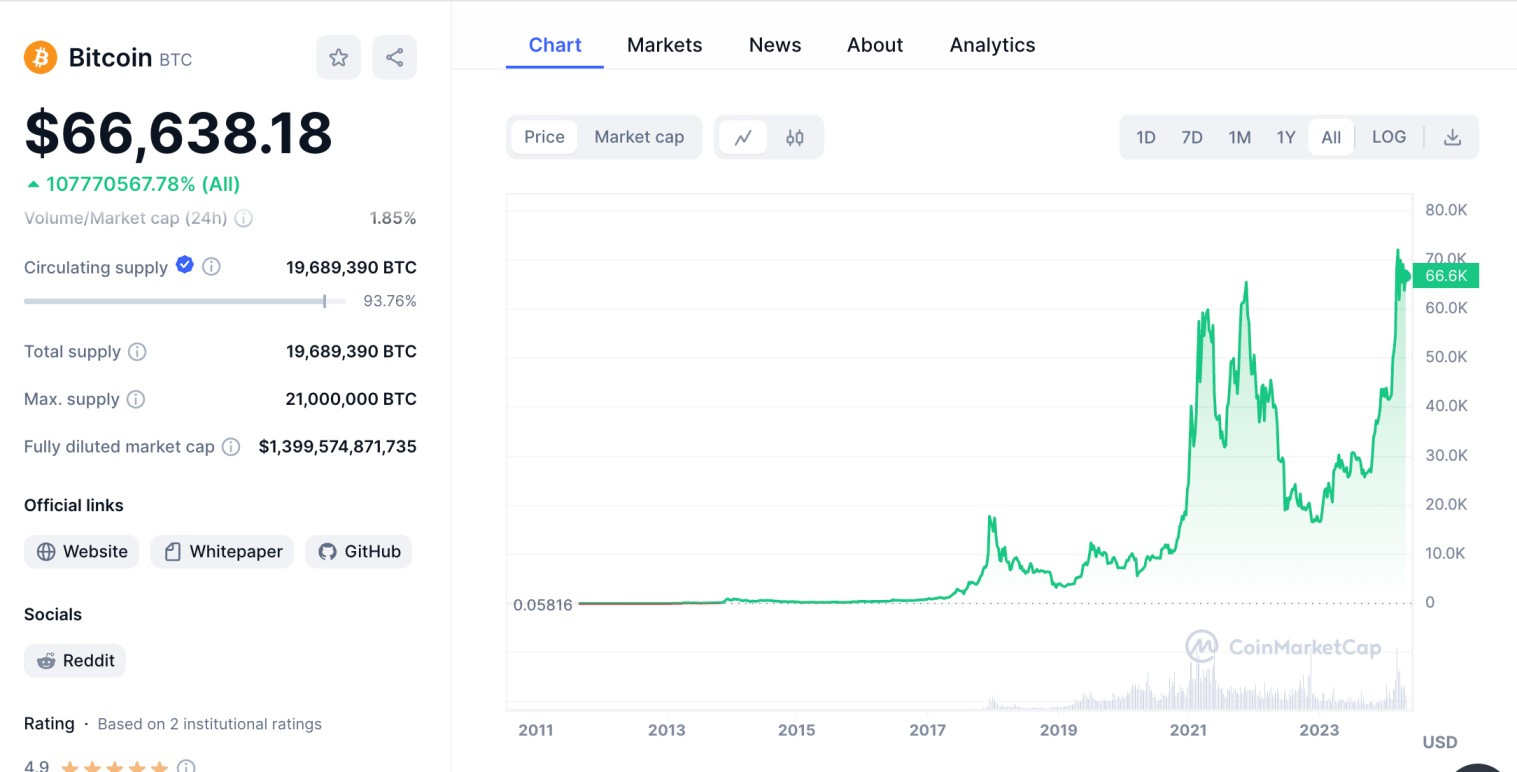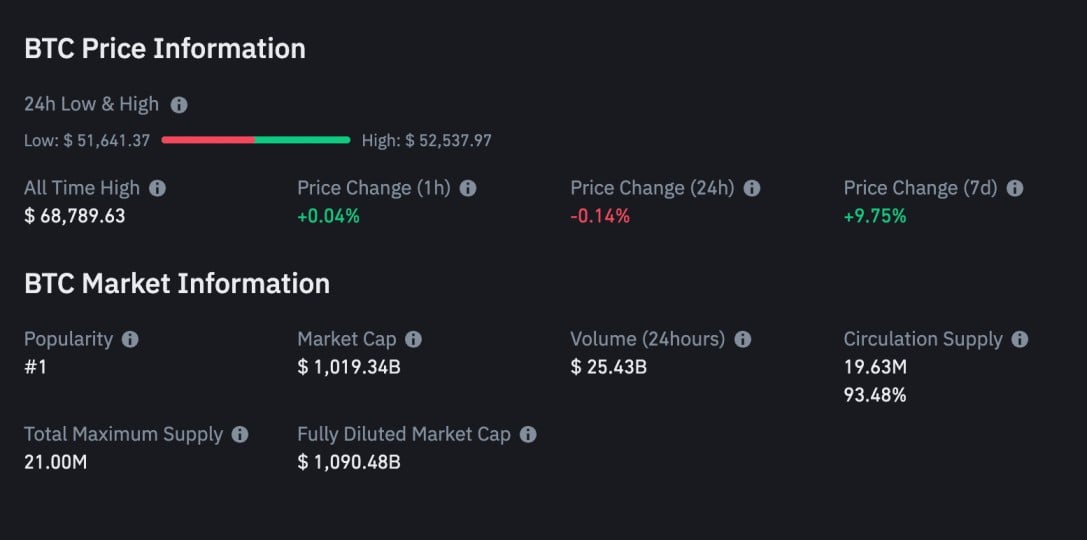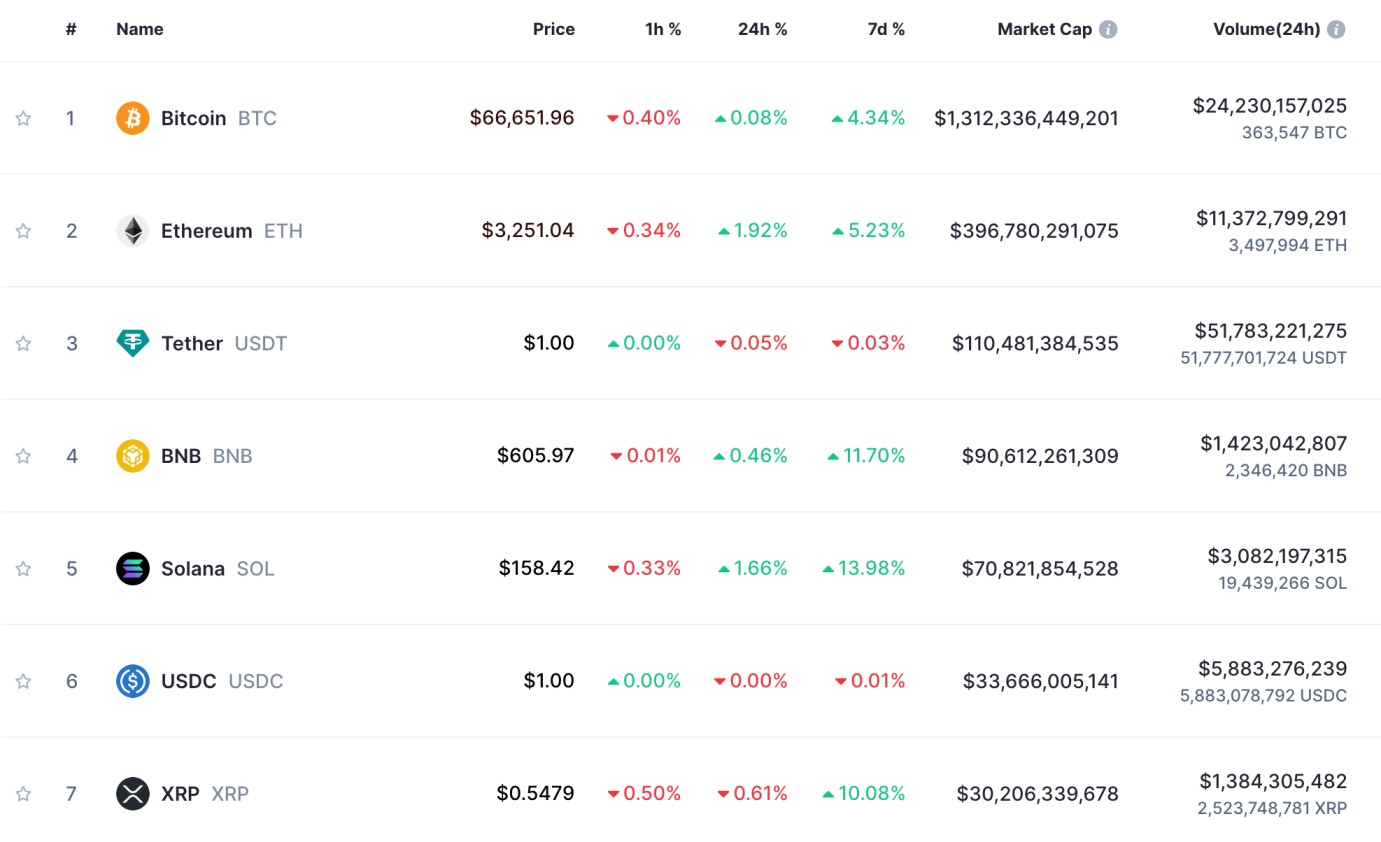Bitcoin is the original and most popular cryptocurrency. Since launching in 2009, Bitcoin has increased by over 100 million percent. But is Bitcoin a good investment in 2024?
Read on to discover my Bitcoin investment thesis. I’ll explore the upside potential and risks, key market developments to be aware of, and best practices when investing for the first time.
Is Now a Good Time to Invest in Bitcoin? My Verdict
Is Bitcoin a good investment? Here’s my summarized answer. Like any financial instrument, Bitcoin comes with benefits and drawbacks. But overall, now could be a great time to begin building exposure. For a start, Bitcoin currently trades below its all-time high, so new investors can secure a discounted entry price. What’s more, Bitcoin recently completed its fourth halving event.
This means mining rewards were reduced by 50%, making the Bitcoin supply scarcer. The SEC recently approved Bitcoin ETFs too, creating seamless access for institutional investors. Another advantage is that Bitcoin is still an emerging asset class. Only a small percentage of the global population owns Bitcoin.
Therefore, even with a trillion-dollar valuation, Bitcoin is still heavily undervalued. Based on historical cycles, Bitcoin is expected to begin its next bull run in 2024. This could result in significant price appreciation, especially considering the new institutional inflows. All that said, Bitcoin operates in a speculative and volatile market – so should still be considered high-risk.
Should You Invest in Bitcoin? The Pros
Beginners will often ask the question; Should I buy Bitcoin now? Bitcoin won’t be suitable for all investor profiles, especially those with a low tolerance for risk. That said, even conservative investors are allocating small percentages of their portfolios to Bitcoin. Let’s explore some of the reasons why buying Bitcoin could make sense in 2024.
Bitcoin has Increased by Over 100 Million Percent Since Inception
Bitcoin is one of the best-performing assets of all time. This is the case even though Bitcoin was only launched in 2009. While growth stocks like Tesla and Amazon have generated substantial returns for early investors, they’re inconsequential when compared to Bitcoin.

According to CoinMarketCap – the leading data aggregation platform for crypto, Bitcoin was trading at $0.058 in August 2011. This is the first recorded price available. CoinMarketCap states that Bitcoin’s all-time high of $73,750 was hit in March 2024. This means that since 2011, Bitcoin has increased by more than 100 million percent.
Bitcoin Continues to Outperform Traditional Financial Markets
Returns in recent years have also been significant – especially when compared to traditional financial markets.
- For example, the S&P 500 has increased by over 72% in the past five years. This amounts to average annualized gains of 14.4%.
- Over the same period, the Bitcoin price has increased by over 1,235%. That’s average annualized gains of 247%.
On a 12-month basis, Bitcoin has increased by 160%. The S&P 500 has risen by 22% over the same time frame. This shows that even with a behemoth market capitalization, Bitcoin can generate substantial growth in a short period of time.
Bitcoin ETFs Open the Markets to Institutional Investors
Bitcoin ETF applications have been filed with the SEC since 2017. All applications were rejected. That was until January 2024 – when the SEC finally approved the first wave of Bitcoin ETFs. This was a watershed moment for Bitcoin, considering it was branded a scam by financial institutions for many years.
Since the SEC approval, billions of dollars worth of Bitcoin ETF investments have been made. Some of the most notable ETF providers include Fidelity, BlackRock, and Invesco. All that said, Bitcoin ETFs are only just getting going. Significant inflows are expected in the coming months and years as more institutions enter the market. This will help Bitcoin reach new levels.
Bitcoin’s Fourth Halving Event Means the Next Bull Cycle is Imminent
Still asking the question; Is Bitcoin a good investment? Another area to consider is the recent Bitcoin halving event. In a nutshell, halvings reduce the number of new Bitcoins that enter circulation. This is based on the rewards that are paid to miners for keeping the network secure.
The mining reward is reduced by 50% approximately every four years. This means there have been four halvings since Bitcoin’s inception. The 10-minute mining reward started at 50 BTC. Today, it stands at just 3.125 BTC. The halving process continues until the Bitcoin supply reaches 21 million. Thereon, no more Bitcoins will be created.
So why do Bitcoin halvings matter? Historically, Bitcoin enters a new bull cycle after the supply is reduced. This typically lasts for more than a year and has resulted in new all-time highs. For example, Bitcoin was priced at approximately $9,700 when it halved in April 2020. Bitcoin peaked at just over $68,000 the following year.
Bitcoin’s Fractionized Supply Makes it Affordable
Bitcoin trades for tens of thousands of dollars. However, there’s no requirement to buy one whole Bitcoin. On the contrary, each Bitcoin can be split into 100 million units (known as ‘Satoshis’). This means no matter your investment budget, you can buy Bitcoin with any amount. Considering the risks, this should be an amount you’re comfortable losing.
Nonetheless, let’s suppose you enter the market when Bitcoin is priced at $60,000. You decide to invest $600. This means you own 1% of one Bitcoin. Just like fractional shares, your gains and losses replicate Bitcoin’s price movements. So, if Bitcoin rises by 40%, your $600 investment will be worth $840. Similarly, if it declines by 50%, your $600 will be worth $300.
Bitcoin Enjoys Premium Liquidity
Bitcoin is a global phenomenon. It trades 24 hours per day, 7 days per week. What’s more, Bitcoin generates substantial trading volumes, meaning it’s one of the most liquid markets worldwide.
For example, in the past 24 hours, more than $25 billion worth of Bitcoin has been traded. Now compare this to a blue-chip stock like Apple. Over the same period, Apple stock saw trading volumes of approximately $10.5 billion. This means more than twice the amount of Bitcoin was traded, even though Apple is one of the largest stocks by market capitalization.

So what does this mean for you as an investor? Put simply, Bitcoin’s strong liquidity ensures you can enter and exit the market at any time. You won’t need to worry about slippage or wide spreads. In addition, after selling Bitcoin, it can easily be converted to cash. You can do this on the best Bitcoin exchanges.
Is Bitcoin Worth Investing in? The Cons
It’s also important to consider the drawbacks when exploring the question; Is Bitcoin a good investment? Some of the core risks include high volatility and prolonged bear cycles. Depending on how you store Bitcoin, there are also counterparty risks. Read on for more information about the pitfalls of buying Bitcoin.
High Volatility and Prolonged Bear Cycles
Bitcoin’s high volatility will be problematic for some investors. Especially those used to investing in more stable markets. The Bitcoin price often witnesses wild pricing swings. First-time investors must be prepared for this before entering the market. While volatility can’t be avoided, it can become inconsequential if you dollar-cost average your investments.
This means buying small amounts of Bitcoin regularly. You’ll pay less when the Bitcoin price declines, and enjoy a portfolio upside when it rises. However, another drawback is that Bitcoin frequently enters prolonged bear cycles. This means the Bitcoin price can decline consistently for many months.
Price declines are particularly sharp when Bitcoin’s bull cycle peaks. For example, Bitcoin peaked at over $68,000 in November 2021. One year later, Bitcoin hit lows of under $17,000. That’s a decline of approximately 75%. Similar declines were seen in prior cycles. While Bitcoin has always recovered and set new all-time highs, this isn’t guaranteed.
Counterparty Risks
Counterparty risks should also be considered before investing in Bitcoin. For instance, consider an investor that buys Bitcoin from an exchange. Leaving the Bitcoins in an exchange account is risky, as you’re trusting the platform to keep them safe. Consider that the FTX bankruptcy saw billions of dollars worth of crypto ‘disappear’, including Bitcoin.

Fortunately, counterparty risks can be avoided. After completing the investment, consider withdrawing the Bitcoins to a self-custody wallet. This enables you to store Bitcoin in a decentralized environment, meaning no third-party involvement. However, you’ll be responsible for keeping the self-custody wallet secure, which in itself is a risk.
Future Bitcoin Returns Could be a Lot More Modest
I mentioned that since 2011, Bitcoin has increased by over 100 million percent. And over the prior five years, Bitcoin has returned more than 1,235%. However, future returns could be a lot more modest. After all, Bitcoin has a market capitalization of over $1 trillion. This makes it harder for Bitcoin to replicate historical returns.
That said, some market commentators believe that the Bitcoin price will eventually reach $1 million. This would mean a 1,400% upside from current prices. Additionally, Bitcoin is still a nascent asset class; just a small percentage of the global population is currently invested. If mass adoption is achieved, Bitcoin’s price trajectory could reach new heights.
What Pro Investors Say About Bitcoin
Is now a good time to buy Bitcoin? Let’s explore what seasoned pros think.
Cathie Wood
One of the biggest proponents of Bitcoin is Cathie Wood – the CEO of ARK Invest. Wood initially predicted that Bitcoin would be worth $1 million by 2030. However, Wood has since increased her upper forecast to $3.8 million.
Wood explained that the specific price point will depend on broader factors, such as adoption and regulation. It also takes into account Bitcoin’s fifth halving, which will happen in 2028.
Michael Saylor
Michael Saylor – the co-founder of MicroStrategy, is an even bigger Bitcoin bull. Saylor believes that Bitcoin could hit $10 million in the coming years.

His firm, MicroStrategy, is now one of the largest Bitcoin holders. According to Bloomberg, MicroStrategy owns about 1% of the total Bitcoin supply.
Charlie Munger
In contrast to Cathie Wood and Michael Saylor is Charlie Munger. Prior to his death last year, the vice chairman of Berkshire Hathaway was a strong opponent of Bitcoin.
Munger was quoted as saying: “It’s like somebody else trading turds and you decide I can’t be left out.” Munger added “I hate the Bitcoin success and I don’t welcome a currency that’s useful to kidnappers and extortionists and so forth.”
Bitcoin, Cryptocurrency and Diversification
I’ve established that Bitcoin is a high-growth asset with huge upside potential. It’s also a volatile asset that witnesses extended bear cycles. With this in mind, first-time investors should employ some risk-management practices.
First, I can’t stress enough how important dollar-cost averaging is. This is the only surefire way of avoiding Bitcoin’s short-term volatility. This means you won’t need to ask the question – is it a good time to buy Bitcoin? Instead, if you believe in the long-term vision, invest small amounts regularly.
This means your cost basis will mirror market trends. What’s more, you’ll avoid the risk of buying the market peak. For example, consider someone who bought $10,000 worth of Bitcoin in November 2021. They would have entered the market when Bitcoin was priced at $68,000. The investment value would have declined to about $2,500 just one year later.

Now consider an investor who dollar-cost averaged their Bitcoin investments monthly. Sure, the first investment would have been at the market peak. But as Bitcoin entered its prolonged decline, each monthly investment would have been at a lower cost price. This averages the cost price over time, turning market downturns into a positive.
In addition, diversification is also important. For example, consider more traditional assets for your portfolio. This might include a mixture of blue-chip stocks and index funds. Gold, silver, and other commodities are also worth considering. You can also create a diversified cryptocurrency portfolio.
While Bitcoin is the gold standard, there are thousands of other cryptocurrencies in the market. These offer a higher upside, especially when investing in smaller-cap projects. For example, you might consider some of the best meme coins. Or other layer 1 blockchains like Ethereum, Solana, and Avalanche. Here’s a quick snapshot of how other popular coins have performed in the prior year:
- Ethereum: 76%
- Solana: 620%
- Avalanche: 133%
- Internet Computer: 173%
- Shiba Inu: 162%
The price percentages above are correct at the time of writing.
What is Bitcoin & How Does it Work?
It’s crucial to understand what you’re investing in before proceeding. Especially when investing in emerging assets like Bitcoin. Here’s what you need to know.
Bitcoin is a cryptocurrency that was launched in 2009. It isn’t owned by any single person or entity and isn’t backed by a central bank or government. Bitcoin was created by Satoshi Nakamoto; an anonymous developer whose real identity remains unknown. Nakamoto developed Bitcoin as an alternative way to build, store, and transfer wealth.
Unlike ‘fiat money’, Bitcoin is decentralized. This means Bitcoin can be transferred without third parties, like financial institutions. This is the true definition of wealth, as nobody other than the Bitcoin holder controls the funds. Bitcoin has a finite supply of 21 million. This makes Bitcoin attractive as a store of value.
Over 93% of the total supply is already in circulation. Every 10 minutes, 3.125 BTC new Bitcoins enter the market. This is reduced by 50% every four years. So, in 2028, the 10-minute issuance will reduce to 1.5625 BTC. Bitcoin is built on a technology called the blockchain. This keeps a public record of all Bitcoin transactions.
However, transactions are matched to the wallet address and not the sender’s identity. This makes Bitcoin a pseudonymous technology. While Bitcoin can also be used as a medium of exchange, most enter the market for speculative reasons. That is, most people buy Bitcoin to make money. This is achieved when the Bitcoin price increases, similar to stocks and index funds.
Ways of Investing in Bitcoin
You should now have a comprehensive answer to the question; Is Bitcoin still a good investment? Next, let’s explore the different ways to invest.
The most popular option is to use a crypto exchange. There are hundreds of exchanges online, but it’s best to use reputable ones that are regulated. Examples include eToro, Coinbase, and Gemini, which are registered with the SEC and FINRA (among other licensing bodies).
These exchanges allow you to buy Bitcoin with a credit card. Not to mention bank transfers and e-wallets like PayPal. After buying Bitcoin, you can withdraw the coins to a decentralized wallet. You can read more about the best decentralized crypto wallets for Bitcoin here.
Another option is to invest in a Bitcoin ETF. This will appeal to beginners who aren’t comfortable using crypto exchanges and wallets. ETF providers like BlackRock hold Bitcoin on behalf of shareholders. This means the value of the ETF rises and falls in line with the Bitcoin price.
However, there can be a disparity in pricing, like all ETFs. Nonetheless, you can invest in Bitcoin ETFs at most stockbrokers. You won’t need to worry about storage or hacks – as the Bitcoins can’t be withdrawn. You’re simply an investor in the ETF, which is the Bitcoin custodian.
Should You Buy Bitcoin Now? My Conclusion
In summary, I’ve answered the question – Is investing in Bitcoin a good idea? The simple answer is yes but be prepared for volatility and wild price swings. Consider dollar-cost averaging your Bitcoin investments. Ensuring your crypto portfolio is well-diversified is also a smart move.
This is because altcoins can offer a higher upside potential than Bitcoin. Check out our comprehensive guide on the best cryptocurrencies to buy to see which coins are hot right now.
Explore the Best Cryptos to Buy
FAQs
Is Bitcoin worth buying?
Bitcoin is an attractive asset class for its high-growth and untapped potential. However, it’s also a risky asset operating in a nascent market, so ensure you consider the risks.
How much could Bitcoin be worth in 2030?
Bitcoin could be worth considerably more in 2030, considering there will be another halving event in 2028. According to some analysts, Bitcoin could surpass $1 million by 2030.
What is the best way to invest in Bitcoin?
The best way to invest in Bitcoin is with a regulated crypto exchange. You can then withdraw the Bitcoins to a decentralized wallet.
Should I invest in Bitcoin or other cryptos?
While Bitcoin is the ‘safer’ play, other cryptocurrencies offer a higher upside. Therefore, it’s also worth considering other popular coins like Ethereum, Solana, and Avalanche.
Is Bitcoin a risky investment?
Yes, Bitcoin is a high-risk investment that witnesses wild pricing swings. The risks are built into the upside potential, with Bitcoin continuously outperforming other assets.
Should I sell my Bitcoin?
Selling Bitcoin before it’s had a chance to reach its full potential might not be the best idea. That said, it’s also wise to gradually take profits when prices increase, so consider your long-term investment strategy.
Will Bitcoin go up?
Many analysts believe that Bitcoin’s value will increase over time. While Bitcoin will experience volatility and prolonged bear cycles, the long-term consensus is positive.
References
- US SEC approves bitcoin ETFs in watershed for crypto market (Reuters)
- Why is Bitcoin Volatile? An Overview of Bitcoin Price Fluctuations (VanEck)
- Embattled Crypto Exchange FTX Files for Bankruptcy (The New York Times)
- Charlie Munger: the aphorism-loving, bitcoin-hating sage behind Warren Buffett (The Guardian)
- MicroStrategy Owns About 1% of All Bitcoin With Latest Purchase (Bloomberg)


